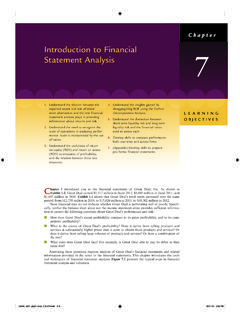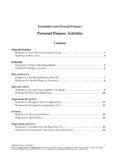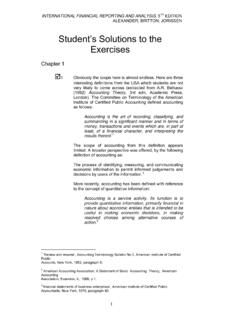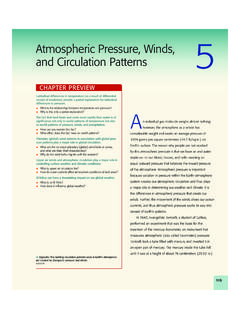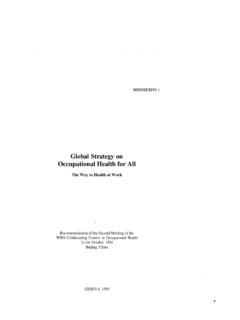Transcription of Defining Macro Practice - Cengage
1 1 Defining Macro PracticeChapter Content Areas1 Conceptualizing Macro PracticeUse of Professional SelfConsumer-Driven Nature ofMacro PracticeOrigins of Macro PracticeCasework, Group Work, andCommunity OrganizingSocial Planning and ResearchPolitical Ideology andMovementsA War on PovertyThe Family Assistance PlanReaganomics and the Safety NetWealthfareA Contract for AmericaThe Welfare Reform Act of 1996A War on TerrorismAnalyzing EnvironmentalInfluencesNASW s Code of EthicsandMacro PracticeEmpowerment and MacroPracticeRespect for ConsumersPromoting Social and EconomicJusticeMACRO SOCIAL WORK PRACTICEWhat is Macro social work Practice ? You will grapple with this question notonly as you read this book, but also throughout your career as a professionalsocial worker. Indeed, practitioners and educators often differ when asked todefine Macro social work you were to ask the instructors in your pro-gram for their definition, you might be surprised at the variety of would most likely vary depending on the era of the social worker sprofessional education, the program from which he or she graduated, and hisor her Practice 01 1-94 10/11/05 2:55 PM Page 1 For many social workers educated in the 1950s, 1960s, and 1970s, the termmacro practiceprobably still seems somewhat foreign.
2 These social workersare more familiar with the notions of social casework (Perlman, 1957), envi-ronmental work (Hollis, 1972), innovation and change with organizations andcommunities (Rothman, Erlich, & Teresa, 1976), social welfare administrationand research (Friedlander, 1976), and group work for social reform (Roberts &Northen, 1976). It would not be unusual for social workers of this era to per-ceive Macro social work in terms of community organization, administration,research, or policy development. Indeed, much of this same language contin-ues to be used today, as social workers have a propensity to define Macro prac-tice in terms of the roles they enact or the functions they 1123456789012345678901234567890123456789 01234567 BOX one of the original books writtenon the topic, Meenaghan, Washing-ton, and Ryan describe Macro practiceas the broad area of change/dynamicadjustment within the human servicearea as it relates to the human servicepractice specialties of planning,administering, evaluating, andorganizing human service activities (1982, p.)
3 6). In a more recent text,Meenaghan describes Macro socialwork Practice in terms of interveningwith organizations, communities, andgroups of people (Meenaghan &Gibbons, 2000).Conceptualization of Macro Practice , as of social work Practice in general,has changed over the years and continues to evolve. From the very origins ofour profession, social workers have demonstrated innovation and flexibility indefining their roles and tasks in relation to the needs and demands of thoseserved, as Gibelman describes:Fluidity exists with regard to how the profession defines itself and theboundaries of what constitutes social work Practice . Some of these debatesabout identity and status have been waged since the earliest days of definitions have emerged about the purview of theprofession in what can be termed an evolutionary and consensus-buildingprocess. (1999, p.
4 299)Indeed, social work is a dynamic profession in that, both knowinglyand also perhaps in less rational ways, its identity has been responsive to socialconditions and climate. Social work Practice and education have long beeninfluenced by development in the broader economy, particularly asthey affected such issues as employment and unemployment (Reisch &Gorin, 2001, p. 9). In addition, popular beliefs, dominant interests, cul-tural norms, historical events, and market or global forces have helped to shapewhat constitutes a social work perspective for helping professionals at any givenpoint in 01 1-94 10/11/05 2:55 PM Page 2 Throughout this book, social advocacy and community organizingarereferenced as two particularly important methods within social work practicefor creating social change. Indeed, these are Macro -level approaches familiar toalmost every social worker.
5 However, the prominence of community organiz-ing and social advocacy in this book is not intended to negate or minimize thevalue of other social work methods ( , social planning, locality development,policy development, research, and administration) in Macro Practice . To thecontrary, a variety of approaches for use in Macro social work Practice areexamined and endorsed in this of the more challenging aspects of being a helping professionalinvolves the ability to question and reflect on one s conscious use of self in rela-tion to professional ideals, the enactment of professional roles, the place ofpractice, and the social-cultural context of human existence. Given that macropractice is a fluid notion, make this pledge early in your professional career:Never lose a commitment to define Macro social work Practice as a component driven bythe will and wants the determination of consumers of , it is the hopes and desires of the people being served, not necessar-ily those of the people in positions of power and authority, that are the fore-most consideration for social workers.
6 Although it is important to work withinthe established mandates and norms of agencies and our profession, our pri-mary alliance is with the consumers of social services. In any form of socialchange, power inherently lies in the strengths and resources of these consumersthemselves, whether they are individuals, families, or groups of people (Salee-bey, 1992). However we choose to define Macro social work Practice , respectfor the consumer-driven nature of social work Practice is DOES Macro MEAN? Macro means large-scale or big. In social work, it involves the ability to seeand intervene in the big picture, specifically with larger systems in the socio-economic environment. Macro social work Practice can include collabora-tion with consumers to strengthen and maximize opportunities for peopleat the organizational, community, societal, and global levels.
7 Indeed, many so-cial workers would argue that it is the Macro level the attention given by socialworkers to the big social issues of importance to consumers that distinguishessocial work from other helping professions (Glisson, 1994).Historically, another term that has been used to describe Macro social workpractice isindirect this term is becoming less popular, the wordindi-rectserved for many years as a reference to social work s commitment to environ-mental modification and the alleviation of social problems. Whereasdirect practiceconnoted face-to-face contact with clients aimed at supporting or strengthen-ing them as individuals,indirect practicewas the catch phrase for change effortsinvolving the environment and the social welfare system (Pierce, 1989, p. 167).For many other social workers, the Macro in Macro Practice is synony-mous with community organizing.
8 Rothman (1964, 1974, 1995) provides theDEFINING Macro PRACTICE332679 01 1-94 10/11/05 2:55 PM Page 3social work profession with a pointed conceptualization of large-scale changethat emphasizes three basic modes: locality development, social planning, andsocial action. As summarized by Weil (1996), locality developmentfocuseson community capacity building and the role of social workers in engaging cit-izens in determining and resolving community-based planningrefers to the use of a rational problem-solving strategy aimed at combating com-munity problems. Social workers use their knowledge and skills in research,assessment, and program implementation as they work with clients to identifylogical steps and means of addressing community actionref-erences the ability of social workers and consumers of services to confront andchange power relationships and the structure and function of important socialinstitutions in can be seen, the term macrohas several connotations, both general and spe-cific.
9 In this text, preference is given to the term Macro social work is often viewed as a nebulous, uncelebrated term in social work ( John-son, 1999), but conceptualizing Macro Practice primarily in terms of communityorganizing is social work practiceis more specific, suggesting theimportance of strengthening higher order social systems organizations, com-munities, and a contemporary illustration of Macro Practice , consider the frustrationmany people feel with health care and mental-health care in the United those fortunate enough to have medical insurance, the advent of managedcare has forced people to try to learn a new and often confusing terminology ofco-payments, provider status, benefit levels, preferred drug lists, average lengthsof stay, and diagnostic groupings (Long & Heydt, 2000). A traditional, microsocial work approach would focus on helping individuals and families to navi-gate health care delivery systems successfully.
10 By contrast, a Macro social work4 CHAPTER 1123456789012345678901234567890123456789 01234567 Thomson Higher Education/Heinle Image 01 1-94 10/11/05 2:55 PM Page 4approach emphasizes seeking ways in which consumers can redefine andchange managed care , both locally and nationally, in order to achieve controlover their lives and promote optimum access to modern Macro Practice ALWAYS BEENA PART OF SOCIAL WORK?The answer is yes, to varying degrees. Interest in promoting social reform andsocial justice to advance the well-being of people has been a major function ofsocial work Practice throughout the years. A more thorough answer, however,requires a brief overview of the historical development of Macro social workpractice in the United of the first writings associated with the profession of social work pro-vide insight into the importance of affecting larger structural issues in the livesof consumers.
